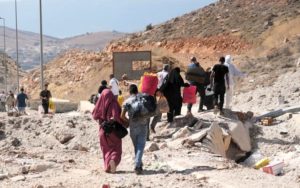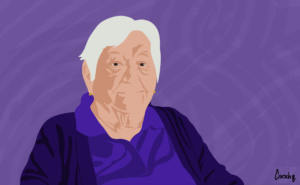The UN in its current form does not serve the citizens it promises to protect. Is it time for a UN 2.0 that puts citizens at the centre? This article, based on a presentation at the International Humanitarian Studies Association conference end August 2018, explains why the current international system is becoming irrelevant. A world citizenship approach must urgently be explored. A good place to start is citizen mobilization around the United Against Inhumanity agenda.
When the founding fathers – and the single founding mother – were assembling the building blocks of the United Nations in the waning months of WWII, they were spurred by the sentiment or, at least, the narrative of ‘never again’. Jettisoning the lofty Wilsonian ideals of the League of Nations, they expressed their vague notions of peace and security through a mix of functionalist ideas (strongly influenced by David Mitrany) and the victors’ can-do capitalist spirit – a sort of Fordism applied to international relations: the right mix of money and technical expertise would set the scene for peace and development ‘in larger freedom.’ Arguably, the notion that collective action problems (i.e. politics) could be solved or at least defused by de-politicizing them through technique is one of the great contributions of the UN to international cooperation. This approach worked more (decolonization) or less well (superpower crossed vetoes). For more than 50 years it was the dominant standard operating procedure – SOP – of the international system.
Then something broke. Despite the heart-warming rhetoric of ‘we the peoples’, the unit of measure in the international system was definitely the State. My country right or wrong – sovereignty – was what was worshipped in the temple of states. Could the founding parents have done otherwise? Were the lessons of the League of Nations learned? Probably not: there was still a war to win and spoils to distribute. The compromises that led to the Charter were based on the status quo, not on any deep thinking about the future. And now we have an ossified system totally impervious to reform.
While states were busy honouring and polishing their tabernacle, the world had moved on. The post-WWII order built on sovereignty, triumphant capitalism, superpower rivalry and spheres of interest collapsed with the Wall, but the institutions established to ‘manage’ this order hardly noticed. It became progressively clear that the ‘system’ was constitutionally unfit to deal with transnationality and that ‘sovereign’ states in the North (as had been the case in the South for decades) were unable to rein-in unregulated transnational capitalism and globalization, not to mention radicalized non-geographical armed groups and movements, the havoc they and the Global War on Terror wreaked, population flows (forced and voluntary) and climate change. Trump and the demise of multilateralism are but an epiphenomenon in the collapse of the so-called rule-based world order. Perhaps Rosa Luxemburg’s prediction that when the capitalist system would run out of an ‘outside,’ to occupy and exploit, it would reach its structural limits and collapse had come true?
Capitalism is of course alive and well. It is the sovereign state as we know it since the Treaty of Westphalia that is paying the price of the unfettered success of globalized capitalism. This more or less liberal ‘state-form’ has expanded in tandem with the capitalist mode of production and no viable alternatives seem to exist to either. But the relationship between the two has gone through an interesting reversal that has Marx and Keynes turning in their graves. The idea of the welfare state is truly gone (well, there are still some vestiges in places like Scandinavia and maybe France and Ireland). No state is willing or able to claw back control over transnational capital and finance. In fact, while states are still important cogs in the inter-state machine, this weakening of the state is functional to capitalist development.
The challenge to the capitalism-sovereign state dyad is thus not coming, as Mark Duffield would put it, from ‘barbarians’ in the borderlands – as these borderlands effectively no longer exist – but from the ‘inside’: from the transantionality of globalized capitalism, transnational millenarist movements, and the like.
What did the UN ever do for us?
A system of global order based on the idealized notion of sovereign states, and their power configurations as they stood 70 years ago, is poorly equipped to deal with collective action problems that are transnational at their core. Moreover, citizens have no say whatsoever in how these institutions are run and for whose benefit. All attempts to reform the UN have failed. Yet it rambles on with its tiny brain and huge dysphoric body to which additional appendages are added as soon as a ‘new’ problem hits the headlines. Conventional wisdom has it that only a WWIII might provide enough motivation and vision to equip the UN for the future. Let’s not go there. Instead, let’s think outside the box.
If UN reform is pointless, then DRUNSA is the answer: don’t reform the UN, start again [1]. Build something in parallel: if it works, it will move centre stage. There is a research agenda here on how to make transnational citizen participation the cornerstone of any institutional reform.
The argument goes like this: the Temple of States was not conceived as a tool to deal with transnationality. It sacralises sovereignty and demonizes the individual with or without citizenship. Yet in transnational times states are unable to cope with crises and citizens have no say on the consequences of transnational forces that affect them directly. Citizenship, for now, is inherently linked to the nation-state. But if the nation-state is no longer able to respond to citizens’ needs and is downright hostile to those seeking refuge or lack citizenship, perhaps the time has come to redefine citizenship by de-linking it from territory. Technology can be pressed in the service of global citizenship so that rights and opportunities could be claimed by all and not just within the confines of national borders. The EU provides some minimalist models of this already. In an extreme example, “if democracy is supposed to give voters some control over their own conditions … should a US election not involve most people on earth?” [2] Should the citizens of, say, Afghanistan who are directly affected by the results of US elections not have a say or even vote in these elections? Ditto the citizens of Yemen who are being bombed courtesy of Western weapon-for-war factories.
This is, actually, not such a revolutionary idea. It has been around for a while. [3]
For now, this is little more than a pipe dream. But shouldn’t the question of the participation of human beings on matters that affect them directly be put on the agenda? And if this agenda cannot be handled by the UN because it goes against the grain of the outdated power dynamics of a sclerotic organization, shouldn’t citizens and civil society start thinking of a UN 2.0 – or better still a UCO (United Citizens Organization)? This UCO would be based on the principle that “as a citizen of the world, I should have a say on anything that affects me”. From climate change to the use of pesticides to conflict resolution to people on the move.
The point here is that mainstream international institutions are increasingly less relevant to the nature and scale of the conflicts and crises of the early 21st century. The toll on civilians caught up or trying to flee vicious wars is particularly high. Armed conflict itself is changing and so is its cortège of humanitarian consequences. We are in a pre-Solferino moment where the old laws no longer work and new ones adapted to the current dispensation have yet to emerge.
The humanitarian internationale suffers from similar ills as the state-based international ‘system’. Its very make up is consubstantial with the state system as it is based on a triad of western donors, UN agencies and prevalently western NGOs (in ethos if not in terms of nationality). It may have reached its structural limits. Humanitarian principles have stood the test of time but it is unlikely that they will survive unscathed the current wave of transnational crises and conflicts. The Geneva Conventions are ill equipped to deal with non geographical wars not to mention forms of armed urban or mafia-style violence that sometimes kill more civilians than traditional ‘wars’. Like areas controlled by ‘terrorist’ groups, shantytowns in Latin America and elsewhere are becoming ‘no go’ areas where a governance of sorts is provided by non-state armed actors.
A good place to start DRUNSA is by bringing the citizen into the decision making around humanitarian action. Rhetoric around participation and accountability to affected communities abounds, but the stubborn reality is that the humanitarian enterprise is anything but accountable or participatory. It continues to be an establishment – some say a club – in which the rules have been set, so to speak, by absentee feudal landlords who have no clue about how the land is tilled. Citizen action needs to re-emerge as a force to hold the powers-that-be to account. More importantly, transnational citizen mobilization – something we saw a lot of in the 1920s and 1930s (International Brigades in Spain, the Third International, the IWW/Wobblies, Sacco and Vanzetti, the Federalist Movement, the anti colonial movement, etc.) – can sometimes achieve results.
To sum up, it is dubious that nation states can have durable success in combating transnational forces (of capital, finance, ethno-religious millenarism and the like). These movements are better countered transnationally through an UCO or coalitions of civil society groups or similar citizen-driven initiatives.
United Against Inhumanity: citizens at the centre
And this brings us to United Against Inhumanity (UAI)– an emerging global movement of citizens and civil society who are outraged by the inability and unwillingness of the formal international system to address the causes and consequences of armed conflict. As explained in more detail in the article by Jean-Baptiste Richardier, the goal of UAI is to provide a channel to the indignation of the growing number of citizens and civil society organisations who refuse to sit back and accept the appalling suffering of civilians caught up in war, or the policies and practices that stop children, women and men fleeing today’s armed conflicts from reaching safety. UAI works with citizen and civil society organizations and puts the citizen at the centre of efforts to combat the inhumanity of warfare and the abomination of measures that deny those in need of refuge the right to seek asylum. It aims to increase the political and reputational damage to perpetrators; and, to support civil society actions on the inhumanity of war and the erosion of asylum.
This, of course, is a tall order. But so was the abolition of slavery, or the struggle for decolonization or for human rights. Difficulty is not an excuse for veiling our face or sitting on our hands. As Seneca used to say: it is not because things are difficult that we don’t do them; it’s because we don’t do them that they become difficult. In an interconnected and networked world, our common humanity compels us to act. If not, we become “accomplices to that which leaves us indifferent.” [4]
[1] Kudos to Martin Barber for having coined the acronym and set up the DRUNSA organization of which, as far as I know, he and I were the only two members.
[2] See Rana Dasgupta, The Demise of the Nation-State, The Guardian, 5 April 2018.
[3] R.Dasgupta; but also earlier work Goodin, Arzideh and others.
[4] George Steiner. Language and Silence. Essays on Language, Literature and the Inhuman, New York: Atheneum, 1967, p 150.











